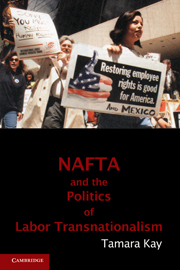Book contents
- Frontmatter
- Contents
- List of Tables
- List of Figures
- Preface
- Acknowledgments
- List of Abbreviations
- 1 Introduction
- PART ONE THE EMERGENCE OF TRANSNATIONALISM
- 2 Labor Nationalism
- 3 NAFTA as Catalyst
- 4 Constituting Transnational Labor Rights
- 5 Seizing the Opportunity NAFTA Provided
- PART TWO VARIATIONS IN TRANSNATIONALISM
- PART THREE CONCLUSIONS
- Appendix
- Bibliography
- Index
5 - Seizing the Opportunity NAFTA Provided
Published online by Cambridge University Press: 05 June 2012
- Frontmatter
- Contents
- List of Tables
- List of Figures
- Preface
- Acknowledgments
- List of Abbreviations
- 1 Introduction
- PART ONE THE EMERGENCE OF TRANSNATIONALISM
- 2 Labor Nationalism
- 3 NAFTA as Catalyst
- 4 Constituting Transnational Labor Rights
- 5 Seizing the Opportunity NAFTA Provided
- PART TWO VARIATIONS IN TRANSNATIONALISM
- PART THREE CONCLUSIONS
- Appendix
- Bibliography
- Index
Summary
In the wake of the NAFTA defeat, North American labor unions that initiated transnational relationships during the struggle could have licked their wounds, ended their relationships, and allowed trinational networks to atrophy. Or they could have limited them to the confines of the NAALC process. Quite unexpectedly, however, key unions and labor federations actually renewed their commitment to a particular kind of internationalism – an internationalism based on equality, trust, and mutualism – and embarked on relationships that marked a dramatic shift in the history of North American union relations. The decision to nurture new relationships catalyzed by the NAFTA struggle suggests that some unions achieved a critical amount of trust and confidence through initial interactions and saw significant benefits to continued collaboration. As these relationships developed, signatory and declarative contacts of old receded into the landscape of North American unionism.
Chapters 6 and 7 examine why some unions did not take advantage of the new institutional opportunities NAFTA provided to develop transnational relationships. This chapter, in contrast, explores why and how three sets of unions/federations – the UE, FAT, and CUSWA; the AFL-CIO, CLC, and FAT; and the CWA, CEP, and STRM – seized the opportunity NAFTA initially provided to push their relationships beyond the constraints of anti-NAFTA coalitions and NAALC procedures in order to build more formal and collaborative transnational relationships. These cases show how newly constituted regional actors quickly extended the boundaries of NAFTA's fields to engage in more extensive labor rights advocacy and activism.
- Type
- Chapter
- Information
- NAFTA and the Politics of Labor Transnationalism , pp. 170 - 196Publisher: Cambridge University PressPrint publication year: 2011



